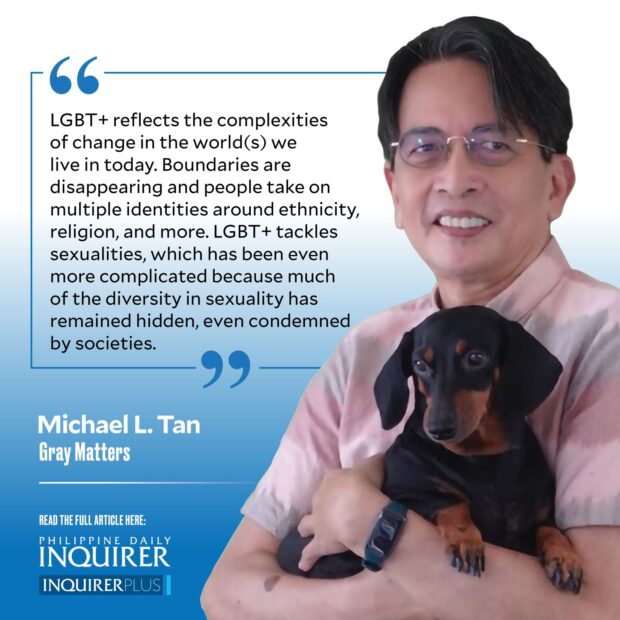Aromantic?
 In the beginning, it was the asexual, and I’m referring to the history of life on earth, when the earliest life forms reproduced asexually, the most common form being fission, a cell simply dividing into two, the two into four, into eight.
In the beginning, it was the asexual, and I’m referring to the history of life on earth, when the earliest life forms reproduced asexually, the most common form being fission, a cell simply dividing into two, the two into four, into eight.
Then, about 10 years ago, another definition of asexual became popular, this time referring to people with little or no sex drive. To this day, I still have people reacting incredulously to the term, mostly asserting that people only pretend not to have a libido.
Then came “aromantic,” sometimes abbreviated to “aros,” describing a spectrum of people who feel little or no romantic attraction. There are varieties here like “grayromantics,” who are “weakly romantic” and the “demiromantics” who have romantic feelings only after a non-romantic bond. (My interpretation: two people who start out as friends, moving on to close friends, and then feeling “the” spark.)
When I explain the term, I don’t get the “Impossible!” remark that greets “asexual.” Instead, people nod, a few will smile and say, “Sounds like my spouse” or “Sounds like my partner.”
Asexual is pretty much accepted in the mainstream now, mentioned and researched in psychology and in some of the health sciences. Moreover, it’s used in the LGBT+ acronym, the plus used to refer to the growing number of additions.
A quick review of LGBT+ is in order.
LGBT+ came about after the Stonewall Revolt in June 1969, when patrons of a New York bar popular with the gay community finally ran out of patience with the constant police raids and harassment. One night when the police launched another raid, the bar’s clients, particularly transgenders (still called transsexuals at that time) resisted. The protests spread and helped to coalesce a Gay Pride movement in the States and, over the years, in other countries, with Pride events and marches.
Pride month is no longer limited to gay communities and as additions were made it became easier to just say LGBT+. The longest version I’ve seen was in an article covering a Japanese Pride march that had a banner that called for equality for the, hold your breath, LGBTQQIAAPPO2S. Try holding your breath a few seconds more to read the translation: Lesbian Gay Bisexual Transgender Queer Questioning Intersex Asexual Ally Pansexual Polyamorous Omnisexual 2-Spirited. Notice there are two A’s in that version—asexual and ally. But no romantic … yet. I am certain there will be more additions in the future.
Why bother with all this?
LGBT+ reflects the complexities of change in the world(s) we live in today. Boundaries are disappearing and people take on multiple identities around ethnicity, religion, and more. LGBT+ tackles sexualities, which has been even more complicated because much of the diversity in sexuality has remained hidden, even condemned by societies.
What we see then is a recognition of the diversity in sexualities as “minorities” coming out of the shadows to work against discrimination and prejudice and with pride in one’s identity and to build communities to support each other.
All this has caused a backlash from conservatives, especially religious ones who prefer a simpler, even asexual world as in denying the existence of sexuality itself and banning its discussions in schools, or even homes. The backlash also includes misinformation, such as claims that anti-discrimination movements are out to promote pedophilia, sexual harassment, and violence.
Think about it—how would you feel if aromantics and asexuals were deemed “abnormal” and banned? Fortunately, what we see are more public discussions and research into the “minorities.”
For this relatively new category of aromantics, I see the need to look deeper into the cultural factor. Some societies are more romantic than others. Social pressures vary, too. This time of the year, for example, when many universities are ending the school year with students and faculty struggling with exams, term papers, and theses, there’s no time for romance and love for some while others turn to more sex as a response to stress.
Beyond pride in sexual diversity, LGBT+ opened the doors to more open discussions, and a better understanding of people we love but who have been marginalized. Be assured, even aromantics and asexuals are capable of great love. If you have your special someone, hug him/her/them with the assurance, “Labsyu, my one and only bato.”
—————–
mtan@inquirer.com.ph




















